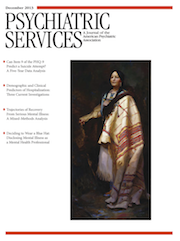Parents’ Stigmatizing Attitudes Toward Psychiatric Labels for ADHD and Depression
Abstract
Objective
There is concern that diagnostic labels for psychiatric disorders may invoke damaging stigma, especially for children. This study compared parents’ stigma toward children with the symptoms of attention-deficit hyperactivity disorder (ADHD) or depression versus the same symptoms plus a psychiatric label.
Methods
Parents (N=225) rated their stereotypes, prejudice, and social distance toward vignettes of children with a developmentally typical range of behaviors, symptoms that met DSM-IV-TR criteria for ADHD or depression, and the same symptoms plus a label of ADHD or depression.
Results
Children described as having symptoms only were more stigmatized than children with typical behaviors (d=.97–2.69). Adding a diagnostic label resulted in significant but small increases in stigma (d=.12–.23).
Conclusions
Parents highly stigmatized children with psychiatric problems, but adding a diagnostic label made only a small contribution to worsening the stigma. The benefits of seeking psychiatric services—accessing treatment and providing validation—may outweigh fears of labeling.



